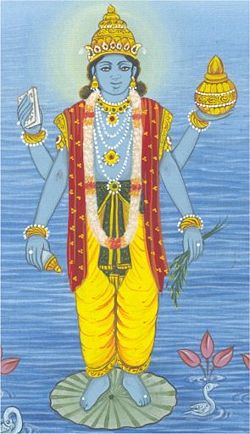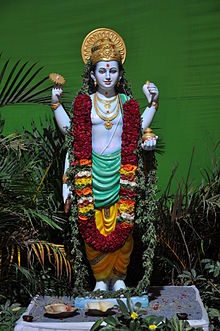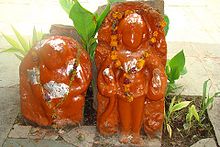- Dhanvantari
-
Dhanvantari 
Ayurvedic medicine Affiliation Deva, Avatar of Vishnu Weapon chakra Dhanvantari (Sanskrit: धन्वंतरि) is an Avatar of Vishnu from the Hindu tradition. He appears in the Vedas and Puranas as the physician of the gods (devas), and the god of Ayurvedic medicine. It is common practice in Hinduism for worshipers to pray to Dhanvantari seeking his blessings for sound health for themselves and/or others.
Contents
The earliest practitioner
Dhanvantari was an early Indian medical practitioner and one of the world’s first surgeons. Based on Vedic traditions, he is regarded as the source of Ayurveda. He perfected many herbal based cures and natural remedies and was credited with the discovery of the antiseptic properties of turmeric and the preservative properties of salt which he incorporated in his cures.
Being a very skilled surgeon according to the standards of his time, he is widely believed to be the pioneer of modern medical practices like plastic surgery.Albeit his methods were a lot cruder and more painful and were used only in emergencies, such as on the injuries of war victims.
All his surgeries were performed without anesthetic, however in spite of his crude methods he was reported to have had a very high success rate. As a result of the brilliance and achievements he displayed in the field of medicine he was chosen as one of the Nine Gems in early Indian ruler Vikramaditya’s court.
According to traditions, he taught surgery methods and procedures to Susrutha, the Father of Ayurvedic Surgery.
The legend
Dhanvantari is depicted as Vishnu with four hands, holding medical herbs in one hand and a pot containing rejuvenating nectar called amrita in another. The Puranas state that Dhanavantari emerged from the 'Ocean of Milk' and appeared with the pot of nectar during the story of the Samudra or Sagar manthan whilst the ocean was being churned by the devas and asuras, using the Mandara mountain and the serpent Vasuki. The pot of Amrita was snatched by the Asuras or Demons, and after this event another avatar, Mohini, appears and takes the nectar back from the Asuras.
Birthday celebration
His birthday is celebrated by the practitioners of Ayurveda every year, on Dhanteras, two days before Deepwali, the Hindu festival of Lights. In the Samudra manthan, Dhanvantari appears with Amrita, Shankha, Chakra and Jalauka[citation needed], in each of his four hands.
In Northern India no permanent temple is established for Dhanvantari. The reason is not yet known, but in Varanaseya Sanskrit Vishwavidyalaya, Varanasi, Uttar Pradesh state, one statue of Dhanvantari is present in the University museum. Two statues are at the headquarters of the Central Council for Research in Ayurveda and Siddha at New Delhi. There is another statue inside the Ayurveda Maha Sammelan office, Dhanawantari Bhawan at New Delhi. However there are few dedicated temples to Dhanwantri in South India especially in Kerala and Tamil Nadu, where Ayurvedic medicine is highly practised and patronised.
Temples in India
In Tamil Nadu, in the courtyard of Sri Ranganathaswamy Temple (Srirangam), is the Dhanvantari Temple where daily worshipping of the deity is performed. In the front of this temple there is an engraved stone believed to date around the 12th Century. The writing on the stone contains the details that Garud Vahan Bhattar, who was a great ayurvedic physician , established the statue inside the temple. As a 'Prasad' or 'Teerth', a decoction of the herbs is given to the visitors.
In India ayurvedic practitioners worship Lord Dhanvantari.
Ashta Vaidya of Kerala
In Kerala, the family of "Ashta Vaidya" is famous and traditionally provide Ayurvedic and Siddha treatment to the sick. The forefathers of these Asta vaidyas are still today serving in the same manner as centuries ago. This family worships Lord Dhanvantari. Some family members have built temples inside their houses while others have built proper temples in his honour. Near Kotakkalat Pulamantol village, here is a family of Ashta Vaidya. This family has a temple of Lord Dhanvantari. Vaidya Madam is near Vadakkancheri. Here the Ashta Vaidya Matra dattan have a statue of Dhanvantri, made of a mixture of five metals. In trishura's Perungva, a big temple is here built by Ashta vaidya. The Ashta Vaidya families are in the following places:
- Aalyittur
- Cannanore (kannur)
- Kuttancheri
- Taikkad
- Vayaskara
- Vellod
- Chirattaman
- Pulamanthole
- Olassa
- Walajapet (near Vellore-Tamil Nadu)
It seems that tradition of Lord Dhanwantri worshipping is regularly persisting in the families to families in Kerala.
- Though not known to many, there is a temple dedicated to Lord Dhanvantari in Kerala. It is in a village called Nelluvaya, 20 kilometers from Guruvayur and Thrissur, located exactly midway between the two towns. The temple is believed to be as old as the temple of Guruvayur. Many ayurvedic doctors from kerala visit this temple before they start practicing medicine.
- About 10 km from the railway station is the ages old, very powerful Dhanvantari Temple, kannur (Cannanore), Kerala. A not so well known temple in its humble environs has a serene atmosphere. Dhanvantari pooja is performed here for the good health of anyone, of any faith, from any corner of the world. Added attraction is the Huge Temple pond with water lilies!
- Similarly, there's a Dhanvantri Kshetram (i.e.temple) in the outskirts of Calicut, in Kerala. This temple is gaining prominence, as people come from far off places to offer their prayers to the Lord, to cure them of their ailing diseases, or to be blessed with a healthy life ahead.
- There is also a Dhanvantari Kshetram in Peroorkkada, Trivandrum which is under the ancient Nair Family of Mazhavanchery Vadakkedom.
- Another famous Dhanvanthari Temple is near Perumbavoor in Ernakulam District of Kerala namely Thottuva Dhanvanthari Temple on the opposite side of Malayattoor on the banks of Periyar (Poorna). Calm and cool atmosphere.A tiny river nearby flowing towards the east is said to have medcinal properties.Now the temple is administered by a Trust.
References
- Kalyan Hindi monthly magazine, March 2001 issue, Geeta Press, Gorakhpur, UP
External links
- Hindu God Dhanwantari: The promulgator of Ayurveda.
- Does Ayurveda begin with Dhanvantari, the ancient physician? By D.P. Agrawal
- Dhanvantari in the Bhagavata Purana
Hindu deities and texts Gods 
Goddesses Texts Avatars of Vishnu Dashavatara 
Other avatars Catursana · Narada · Nara-Narayana · Kapila · Dattatreya · Yajna · Rishabha · Prithu · Dhanvantari · Mohini · Vyasa · Prsnigarbha · Hayagriva · Hamsa*Buddha or Balarama is considered the ninth avatar of Vishnu, depending on the tradition. In North India, Buddha is included and in south India, Balarama.Categories:- Hindu gods
- Ayurveda
- Forms of Vishnu
- Health gods
Wikimedia Foundation. 2010.


